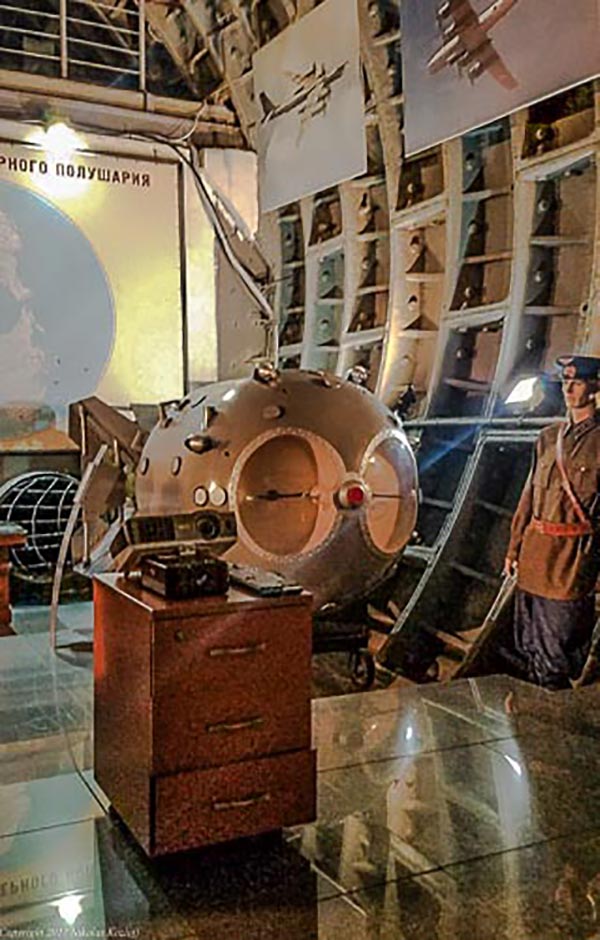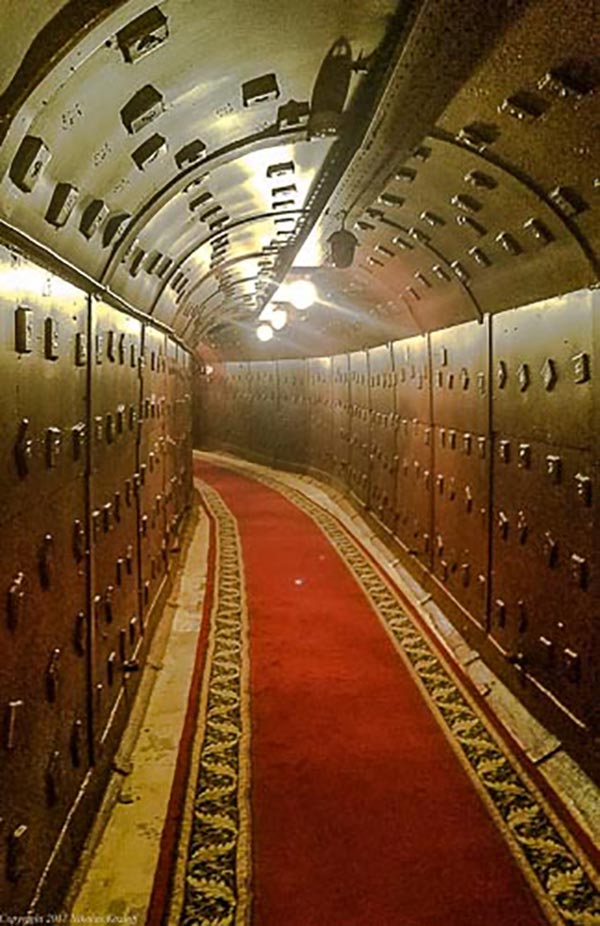
Dissecting the “Trump-Russia Affair” and Emerging “New Cold War”
One can scarcely read the news these days without coming across references to the threat of an imminent “new Cold War.” Gravely, experts warn of escalating tensions being ratcheted up as a result of western sanctions against the Kremlin, ongoing friction in Ukraine in addition to any number of other dangerous flashpoints, not to mention the ongoing Trump-Russia affair which has exposed Putin’s daring interference campaign in the 2016 election. How much credence should we give to dire forecasts about a new Cold War? What are the different interest groups which employ such terminology, and what should we make of distinct partisan agendas? Most importantly, if we are indeed in the midst of a new Cold War, how can we avoid all-too-familiar patterns and missteps from the first Cold War?
Experts disagree somewhat on when east-west relations broke down precisely, with some pointing the blame at successive U.S. presidents who pressed for aggressive NATO expansion and failed to shore up the ailing Russian economy. Others point to Russian provocations, such as the Kremlin’s 2008 invasion of the former Soviet republic of Georgia amidst simmering conflict over two breakaway republics. Three years later, Russian protesters took to the streets, accusing Putin of having rigged parliamentary elections. At the time, Secretary of State Hillary Clinton issued a strong statement in which she blasted the elections as dishonest and unfair, a charge which reportedly stung Putin personally and may have subsequently led the Kremlin leader to seek political revenge.
In 2012, Putin returned to the presidency after an interlude as prime minister, and in short order embarked on a more confrontational foreign policy. Wikipedia no less remarks that the “New Cold War” may have been sparked by the EuroMaidan revolution and ensuing political disarray which led to Russia’s annexation of Crimea. Politico declares, “When Putin ordered Russian ‘little green men’ into Crimea early in 2014, their armed takeover of the peninsula from Ukraine marked the first forcible annexation of territory in Europe since World War II. Ever since, no one has been talking about the great, historic ending of the Cold War…[and] talk of Cold War redux is nearly inescapable, in Russia as well as in the United States.”
Defining the “New Cold War”
According to the Weekly Standard, “the new Cold War is subtler and more cryptic than its predecessor. So far it involves hacked websites and email servers rather than proxy wars in Asia or Africa; ‘fake news’ rather than diplomatic summits; inflammatory social media ads rather than the threat of thermonuclear annihilation.” In the digital era, declares New Statesman, “conflict can be carried on in a grey world of actions that are hard to attribute, and may be enacted by private individuals and groups acting as agents of the state. When critical information systems go down suddenly, affecting banking or a government bureaucracy, or fake and inflammatory messages overwhelm social media, the fact that Russia is responsible may be obvious but hard to prove.”

The cloak and dagger world of cyber-warfare may “allow for provocations just below the threshold of what might lead to a hot war,” though to be sure other hybrid forms of aggression such as the use of chemical nerve agents have contributed to deterioration of east-west relations. And though the new Cold War features new tactics like computer hacking, in other respects the conflict bears familiar signs. For example, in a replay of Cold War 1.0, Putin has introduced new nuclear weapons including a cruise missile which, Russia claims, could reach any target throughout the world. NATO generals, meanwhile, have been warning of Russia’s conventional military buildup near Baltic nations.
Despite such saber rattling, observers remark that Russia faces daunting challenges and therefore Cold War II may differ from the preceding conflict in certain respects. Moscow has been subjected to economic sanctions and the country suffers from capital flight. Meanwhile, Russia is economically weak, lacks foreign investment, and depends almost entirely on energy resources for cash revenue at a time of low international oil prices. In addition, Russia finds itself in a far weaker strategic position than the former Soviet Union, as three former republics and all countries of the former Warsaw Pact are currently NATO members. As if that weren’t sobering enough, consider that Russia is beset with falling demographics and a serious drug and alcohol problem as well as falling life expectancy.

Battle of Ideas
In other key respects, the new Cold War differs from Cold War I. Take, for example, the “battle of ideas” for “ideologically speaking, the once definitive struggle between the monolithic rival systems of Marxist communism and free-market capitalism has largely evaporated for want of interest.” Newsweek declares that the Russian threat is “parochial” in relation to Communism, which had an appeal “from Hanoi to Havana, and Moscow was the patron to self-styled revolutionaries worldwide.” Putinism, on the other hand, “isn’t exactly going to spread like those Che Guevara T-shirts” since it lacks international appeal and Kremlin “ideology,” if such a thing even exists, is essentially just “an expression of Russian nationalism, a carte blanche for oligarchs, with a dollop of anti-gay thuggery.”
Going further, Politico writes that Putin doesn’t think in traditional Cold War terms but rather “imperial great-power competition of the 19th century.” Throughout his tenure, Putin has revived long dormant Czarist symbolism and the Kremlin leader’s “fondest ideal is not to be the reincarnation of Stalin as much as the modernized avatar of the Romanovs. This is suggested by the imperial palace in Saint Petersburg that he renovated for himself early on, and by the myth-like narratives of Russian greatness that he offers his public.”
When compared to ostensible western values of fair elections, adherence to human rights, freedom of expression, religious tolerance and rule of law, it’s difficult to see how Putinism and oligarchic rule will gain much of an international following. And yet, Western Europeans are concerned that Trump lacks respect for NATO and they are nervous about his support for Brexit and anti-European movements. And while some members of the Trump cabinet have expressed support for traditional alliances, the president’s dalliances with Putin have split the Republican Party and alarmed the national security brass, which believes that Russia might be able to dominate its former sphere of influence without even staging de facto military invasions.
Speaking with the New Yorker, former Clinton adviser Strobe Talbott remarked that there is “a very real danger” that “we” are going to lose Cold War II. When he was asked about the ramifications of “losing” the new Cold War, Talbott said the world risks an “unraveling” or constant instability at best and nuclear confrontation at worst. “The not quite apocalyptic answer,” he added, “is that it is going to take years and years and years to get back to where we—we the United States and we the champions of the liberal world order—were as recently as five years ago.” The New Yorker also quotes Boris Yeltsin’s foreign minister, Andrei Kozyrev, who remarked, “my fear is that this is probably the first time in my memory that it seems we have the same kind of people on both sides—in the Kremlin and in the White House…It’s probably why they like each other. It’s not a matter of policy, but it’s that they feel that they are alike. They care less for democracy and values, and more for personal success, however that is defined.”
From Trumpians to Neo-Conservatives to Liberal Hawks
What are the likely political constellations which may seek to frame the discussion over east-west tensions in future? Perhaps, public reactions to the Robert Mueller investigation and its widening probe into the Trump administration’s alleged ties to Russia may offer some clues. Broadly speaking, the different camps consist of Trump and his nativist and authoritarian base; neo-conservatives, which may opportunistically ally with Trump or alternatively ally with liberal hawks, and the authoritarian left.
Bizarrely, Trump supporters have dismissed the Mueller affair as a conspiracy emanating from the so-called “Deep State” to tarnish the president. In a strange twist, Fox News now blasts the F.B.I. and the national security state apparatus, which normally can do no wrong in the eyes of the political right. Even more oddly, Trump speaks of a rapprochement with Russia, which for years represented the great bogeyman and “evil empire” for conservatives. This has probably served to embolden Putin by convincing the Kremlin leader that he can get away with a more expansionist policy within the former Soviet sphere.
Bereft and disoriented by Trump’s shattering of the Republican Party, old-guard neo-conservatives have struggled to gain their footing. Some figures from the George W. Bush era have taken to cable news, where they regularly denounce Trump for hijacking the country and corrupting democratic institutions. Other neo-conservatives seem intent on hedging their bets with Trump, or alternatively modifying some of their views, no doubt in the hope of gaining influence over the White House.
Even more outlandishly, some neo-conservatives have been rehabilitated and given wide exposure on MSNBC, a cable network which at one time was critical of the Bush administration and regarded as liberal. Such neo-conservatives are routinely given billing with members of the F.B.I. and C.I.A., entities which have hardly been partial toward leftist movements over time. Together with establishment figures from the Obama and Clinton eras, neo-conservatives seek to re-establish the sanctity and legitimacy of American institutions, as opposed to Trump who seems intent on ripping them down.
Panelists on cable news follow a familiar script when it comes to the “new Cold War.” When discussing renewed tensions with Russia, pundits constantly frame the conversation by saying that “we” (which is equated with “the United States”), must counteract “Russia” or “Russian interests,” a drastic oversimplification. Just as hawks brought the world to a dangerous precipice during the Cold War, the realignment of liberals and neo-conservatives might pave the way for a rehabilitation of the national security state and the rise of a kind of hyper-American patriotism which could, in the long-term, prove to be destabilizing in its own right.
From Cold War Liberals to Present Day
Present day liberal hawks hark back to so-called “Cold War liberals,” defined by Wikipedia as “liberal politicians and labor union leaders who supported democracy and equality. They supported the growth of labor unions, the civil rights movement, and the War on Poverty, while simultaneously opposing totalitarianism and Communist Party rule. Cold-War liberals therefore supported efforts to contain Soviet communism.” The New York Times writes that before Vietnam “and the disappointment and confusion it spawned,” liberals had a clear vision of their own as envisioned by diplomats such as George Kennan. In contrast to conservatives, Kennan talked about the struggle for democracy but also emphasized economic opportunity. During the Truman administration, which spearheaded the Marshall Plan in Europe, Kennan refrained from using foreign aid as a means of reconfiguring European economies, and the diplomat actually assisted socialist parties.
Fast forward to the present day, and “Cold War liberalism seems to be making a comeback.” Newsweek writes that “When Hillary Clinton called Trump Putin’s ‘puppet’ during the third presidential debate, some older viewers might have had a flashback to 1960, when Kennedy moved to the right of Richard Nixon by taking a super hard line on the ‘missile gap’ with Moscow (it later proved to be a myth).” The publication goes on to note that “Cold War liberalism might just be dormant, not dead. Just as the Republicans have lurched back to their more isolationist days with a president who touted America first in his inaugural address, the hawkish impulse lies deep in the Democratic DNA.” In an echo of Kennan, today’s hawkish liberals believe in preserving alliances with Europe as opposed to the United States “going it alone.”
New Cold War liberals like Adam Schiff have found their perch on the likes of MSNBC. The top ranking Democrat on the House Intelligence Committee investigating alleged collusion between Trump’s circle and Russia, Schiff has advocated an aggressive posture toward Russia. Reportedly, the Congressman has strong ties to weapons manufacturing companies and favors arming Ukraine. Meanwhile, Newsweek adds, “some of the possible 2020 Democratic presidential candidates, like Senator Elizabeth Warren, have migrated to the Senate Armed Services Committee, where Clinton sat for eight years. That’s a perch you use to show your hawkish credentials. If you’re running for president just on butter and not guns, you stick to assignments like agriculture.”
The Authoritarian Left
Just as neo-conservatives and liberals seem to have harked back to the Cold War in certain respects, the authoritarian left is also reverting to type by mimicking the earlier behavior of Stalin’s so-called “useful idiots.” Today, the authoritarian left occasionally organizes street protests but represents more of an impulse or tendency within certain political circles and the internet, ranging from former Bernie supporters to the Green Party and others. Influential opinion makers include Glenn Greenwald and media outlets such as The Nation magazine and Jacobin, whose mere title evokes 18th century proto-totalitarianism. Predictably, the publication has recently taken to shredding the likes of new Cold War liberals such as the aforementioned Congressman Schiff.
Typically, the hard left looks at the world in a simplistic light in which the military-industrial complex is regarded as the greatest threat, while other authoritarian governments are ignored. Such agendas were placed on vivid display even before the 2016 election, for example during Ukraine’s EuroMaidan revolution. To the hard left, it was the U.S. which was most responsible for steering or driving events in Kyiv in an effort to thwart Putin and pro-Russian interests in Kyiv, as opposed to the Ukrainian people and even some progressive elements seeking to rid themselves of a corrupt, brutal and oligarchic regime. During the 2016 election, many within this constituency saw Hillary Clinton as the main enemy and representative of the national security state and hawkish foreign policy views while discounting the possibility that Trump might be worse in many respects.
To be sure, hawks brought the world to the brink of nuclear catastrophe during the first Cold War, and there are legitimate reasons to fear this constituency will launch a return to historic tensions. But the hard left too has gotten enmeshed in its own misguided rhetorical framework predicated on the notion of “we,” meaning “the United States.” In this version, however, the neo-conservative view is turned on its head, with Putin merely standing up for “Russian interests” whereas “we” should reconsider how to treat the Kremlin. The hard left goes even further by pooh-poohing “Russia Gate” as a hoax and some kind of exaggerated and sinister campaign orchestrated by the national security state for its own ends. Bizarrely, therefore, the hard left has in certain ways landed on the same page as Trump, as both seek to discredit or cast doubt on the “Deep State.”
Same Old Establishment Cold War Ideas
In one way or another, the old Cold War policy establishment has adopted highly flawed, anachronistic or unworkable ideas at best, and dangerous or inflammatory views at worst. Take, for example, James Stavridis, a former NATO supreme allied commander who has offered his own wonky policy proscriptions on the pages of Foreign Policy magazine. Falling into familiar rhetorical traps once again, Stavridis argues that “we” should strengthen and expand NATO while committing ourselves to ongoing military exercises conducted on Russia’s borders.
A more detailed analysis has been provided by Edward Lucas, a veteran Russia correspondent. In his book, The New Cold War: Putin’s Russia and the Threat to the West, Lucas advocates energy independence from Russian gas, excluding the Kremlin from international organizations, strengthening Washington’s alliance with the European Union and beefing up NATO in the Baltics, among other measures. Yet even Lucas admits that visa sanctions and asset freezes tend to reinforce the Kremlin’s nationalistic messaging about outside encirclement. What’s more, the West has already suspended Russia from the G-8 and pushed sanctions which have failed to make an impact on Kremlin behavior.
In her piece for Politico entitled “Trump, Putin and the New Cold War,” Susan Glasser adopts the same familiar rhetorical framework by referring to “our course.” The columnist doesn’t seem to have many ideas about how to get “us” out of the morass, remarking that “A best-case scenario (or least a best-we-can-do scenario) may well be a return to the containment policies of a previous generation. We can work with and through our European allies, shoring up NATO, supplying arms to the battered front-line state of Ukraine.” Glasser, however, has ultimately little to offer, and remarks at the end of her long-winded essay that “a full generation after the first Cold War ended, we are back to buying time. Back to shrugging our shoulders about what happens on Europe’s eastern borders and consigning Russians to their fate. Integrating Russia with the West was the cornerstone of American policy since 1991. It has failed. There is no new plan.”
Liberal Hand-Wringing
Writing in the Huffington Post, meanwhile, columnist Robert Kuttner engages in some liberal hand-wringing. “I am…aware of the terrible costs of war, even cold war, and am not one to suggest military escalation lightly,” he notes, adding that “I spent my youth opposing the Vietnam War… I am aware that I am playing against type by arguing this case. As a progressive, I am all too aware that the U.S. does not have clean hands ― America has a long history of destabilizing and even overthrowing regimes that it doesn’t like…But Russia’s actions do pose an existential threat both to American democracy and to America’s basic physical security.”
Kuttner believes that cyberwarfare countermeasures will ultimately prove insufficient and could lead to dangerous escalation, and so the U.S. should treat Russia as a “pariah” by cutting off the nation’s access to the West’s banking system. “Russian business interests are shockingly free to invest in the West at will,” he notes, “to buy real estate, often with shell companies to hide assets. That could be closed down, as well.” Yet Kuttner himself admits that “about the last person on earth likely to consider this course is the current president of the United States. Putin is able to escalate these incursions because of one man ― Donald J. Trump.”
Having acknowledged the unfeasibility of his very own ideas, Kuttner then echoes liberal hawks on MSNBC by writing “even though the president makes foreign policy, there is a major role for Democrats in confronting the Kremlin. By demanding that America get serious about Putin with a diplomacy that he will take seriously, Democrats demonstrate that they are more patriotic and more reliable on national security than Trump.”
Moving Beyond the New Cold War
It’s rare to read anything which breaks free of worn out clichés on these matters, yet Michael Klare astutely steers clear of the “us” vs. “them” trap by simply referring to “peace advocates.” Writing in the otherwise all-too-predictable Nation magazine, Klare remarks “to preserve peace in this new era, it will be necessary to revive many of the disarmament initiatives of the original Cold War era, while also reinvigorating them with the organizational and communications advances of more recent years… We can survive this New Cold War, but only through the same sort of activism that helped to end the first one.”
In moving the discussion away from abstract notion of “us,” which is apparently equated with the entire U.S. government in the minds of policy wonks, Klare has shifted the debate over the new Cold War in a much more productive and fruitful direction. Yet Klare too is parochial and only gets it half right: amidst all the chatter about what to do about “that inscrutable Putin” and “Russian interests,” the U.S. public has heard precious little about people within the former Soviet sphere who are striving to build more socially equitable, inclusive and tolerant societies. Confronted by the Kremlin, rapacious oligarchs and right wing nationalism, sympathetic elements in Russia and Ukraine been left with nowhere to turn.
Meanwhile, the spread of nativism, xenophobia and authoritarianism in the West— trends which have been associated with so-called “oligarchic rule” in areas of the former Soviet Union — has severely tarnished conventional notions that the U.S., or even Western Europe for that matter, constitutes some kind of exceptional “bastion of civilization.” In the struggle to avert a new Cold War, like minded folk should avoid partisan dogma and challenge authoritarian institutions and authoritarian politics everywhere, be it the U.S. national security state or Putin’s Russia for that matter.


Leave a comment